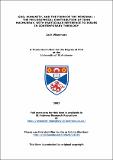Files in this item
God, humanity, and the form of the personal : the philosophical contribution of John Macmurray, with particular reference to issues in contemporary theology
Item metadata
| dc.contributor.advisor | Hart, Trevor A. | |
| dc.contributor.author | Wisemore, Jack | |
| dc.coverage.spatial | xiv, 276 p. | en_US |
| dc.date.accessioned | 2018-04-26T14:22:53Z | |
| dc.date.available | 2018-04-26T14:22:53Z | |
| dc.date.issued | 2002 | |
| dc.identifier.uri | https://hdl.handle.net/10023/13236 | |
| dc.description.abstract | Recent trends in theology have created an environment where the thought of John Macmurray, a twentieth-century Scottish thinker and Professor of Moral Philosophy at the University of Edinburgh, is increasingly relevant. In particular the reemergence of a robust trinitarianism has raised issues surrounding relational concepts of person and the nature of the relationship between human and divine persons. Macmurray's philosophy is cited as a contemporary example of persons in relation which parallels certain Cappadocian and Athanasian notions of the Trinity. The relationship between Macmurray's anthropology and his theology, however, is largely unexplored, due in part to confusion over the exact nature of his doctrine of God as well as the lack of a thorough exposition of his thought as a whole. Because of the highly integrated nature of Macmurray's work one cannot properly understand the philosophical, anthropological, or theological dimensions in isolation from each other. Therefore this thesis considers these three dimensions of Macmurray's thought, providing a systematization and clarification of his philosophy, anthropology, and theology. Through the interaction between the philosophical, anthropological, and theological aspects of Macmurray's thought the ontological and epistemological relationship between God and humanity surfaces. Ontologically Macmurray clearly differentiates between God and humanity. Yet epistemologically there is a necessary relation because all human knowing and reflection is conditioned and limited by human reality. Since Macmurray believes humans experience God, he believes all human knowledge of God must be expressed within the terms of human reality. This does not necessarily lead to anthropomorphism as long as one realizes one is speaking in a limited and theoretical fashion about God who is at least personal. Macmurray's thought is then used to critically engage the theology of Moltmann, Gunton, Torrance, Cunningham, and Lampe particularly with respect to their understandings of the divine-human relationship. | en_US |
| dc.language.iso | en | en_US |
| dc.publisher | University of St Andrews | |
| dc.subject.lcc | BR100.M6W5 | |
| dc.subject.lcsh | Macmurray, John, 1891-1976. | en |
| dc.subject.lcsh | Theological anthropology--Christianity. | en |
| dc.subject.lcsh | Christianity--Philosophy. | en |
| dc.title | God, humanity, and the form of the personal : the philosophical contribution of John Macmurray, with particular reference to issues in contemporary theology | en_US |
| dc.type | Thesis | en_US |
| dc.type.qualificationlevel | Doctoral | en_US |
| dc.type.qualificationname | PhD Doctor of Philosophy | en_US |
| dc.publisher.institution | The University of St Andrews | en_US |
This item appears in the following Collection(s)
Items in the St Andrews Research Repository are protected by copyright, with all rights reserved, unless otherwise indicated.

